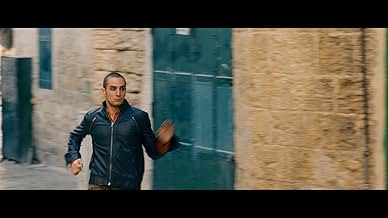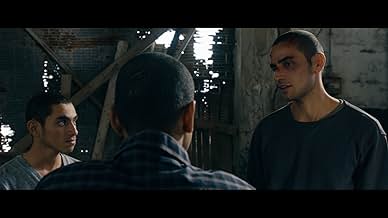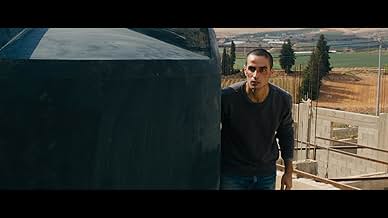CALIFICACIÓN DE IMDb
7.5/10
16 k
TU CALIFICACIÓN
Un joven palestino luchador por la libertad acepta trabajar como informante después de que lo engañen para que reconozca su culpabilidad por asociación a raíz del asesinato de un soldado isr... Leer todoUn joven palestino luchador por la libertad acepta trabajar como informante después de que lo engañen para que reconozca su culpabilidad por asociación a raíz del asesinato de un soldado israelí.Un joven palestino luchador por la libertad acepta trabajar como informante después de que lo engañen para que reconozca su culpabilidad por asociación a raíz del asesinato de un soldado israelí.
- Dirección
- Guionista
- Elenco
- Nominado a 1 premio Óscar
- 13 premios ganados y 12 nominaciones en total
Eyad Hourani
- Tarek
- (as Iyad Hoorani)
Waleed Zuaiter
- Agent Rami
- (as Waleed F. Zuaiter)
- Dirección
- Guionista
- Todo el elenco y el equipo
- Producción, taquilla y más en IMDbPro
Opiniones destacadas
"Omar" is so topical in content and authentic in form that it feels as though it had been ripped straight from the morning's headlines. This Oscar-nominated Palestinian film may not be as "fair and balanced" in its depiction of the seemingly endless and intractable Mid East conflict as some might wish it to be, but, like all good social dramas, the movie is far more concerned with exploring the human condition than with scoring political points.
Omar (Adam Bakri) is a young Palestinian baker who, at great risk to himself, regularly scales the massive wall that runs through occupied Palestine to hang out with his friends, Tarek (Iyad Hoorani) and Amjad (Samer Bisharat), and to carry on a secret romance with his girlfriend, Nadia (Leem Lubany), who also happens to be Tarek's sister. The three young men are also active as "freedom fighters," dedicated to liberating their people from Israeli control. After Amjad shoots and kills an Israeli soldier, Omar is arrested and coerced into becoming a spy in exchange for his freedom. Against this backdrop of simmering social and ethnic unrest, the bonds of friendship are tested in ways that will surprise and move you.
Though the geographic, sectarian and boundary issues could be a bit more clearly defined for audiences less familiar with the area, the screenplay by Hany Abu-Assad finds its truth in its portrayal of what day-to-day life is like for the ordinary people who call that part of the world home. Omar and his buddies may be passionately partisan about their cause, but that doesn't mean they aren't complex, three- dimensional characters in their own right. For underneath all the outward bravado and righteous bluster, they are still just "boys" after all, with all the interests and concerns that all young men have who are embarking on this journey we call life - a journey made all the more arduous and challenging by the world in which they live.
Assad's direction is taut when it needs to be (particularly in the striking foot chases through the narrow streets and alleyways of the prison-like city) and observant and patient when that is what is called for.
All the actors are excellent, but special mention must be made of young Bakri, who, as the title character, runs the emotional gamut from explosive to sheepish without missing a beat, his sly, toothy grin standing in direct counterpoint to his steely gaze and serious mien. It is Bakri who largely cuts through the polemics and who makes the story one to which all of us can relate. Well worth seeing.
Omar (Adam Bakri) is a young Palestinian baker who, at great risk to himself, regularly scales the massive wall that runs through occupied Palestine to hang out with his friends, Tarek (Iyad Hoorani) and Amjad (Samer Bisharat), and to carry on a secret romance with his girlfriend, Nadia (Leem Lubany), who also happens to be Tarek's sister. The three young men are also active as "freedom fighters," dedicated to liberating their people from Israeli control. After Amjad shoots and kills an Israeli soldier, Omar is arrested and coerced into becoming a spy in exchange for his freedom. Against this backdrop of simmering social and ethnic unrest, the bonds of friendship are tested in ways that will surprise and move you.
Though the geographic, sectarian and boundary issues could be a bit more clearly defined for audiences less familiar with the area, the screenplay by Hany Abu-Assad finds its truth in its portrayal of what day-to-day life is like for the ordinary people who call that part of the world home. Omar and his buddies may be passionately partisan about their cause, but that doesn't mean they aren't complex, three- dimensional characters in their own right. For underneath all the outward bravado and righteous bluster, they are still just "boys" after all, with all the interests and concerns that all young men have who are embarking on this journey we call life - a journey made all the more arduous and challenging by the world in which they live.
Assad's direction is taut when it needs to be (particularly in the striking foot chases through the narrow streets and alleyways of the prison-like city) and observant and patient when that is what is called for.
All the actors are excellent, but special mention must be made of young Bakri, who, as the title character, runs the emotional gamut from explosive to sheepish without missing a beat, his sly, toothy grin standing in direct counterpoint to his steely gaze and serious mien. It is Bakri who largely cuts through the polemics and who makes the story one to which all of us can relate. Well worth seeing.
If the saga of Omar were a wine, it would have to be described as "Shakespearian, with notes of Dante, Orwell, Golding, and Sartre." Omar is a basically decent, seemingly uncomplicated young bakery worker who is inexorably drawn into the violent political warfare of the West Bank through his love for a girl, his increasingly radicalized circle of friends from childhood, and Israeli injustice. Right up to its unexpected, yet expectable, ending Omar is more victim than protagonist.
Clearly anti-Israeli in tone, the film explores the many reasons why Palestinians maintain an abiding antagonism toward Israel and Israelis. A driving metaphor in the film is the 25 foot high wall that Omar scales regularly to visit Nadia, his intended. Although The Wall was ostensibly designed to separate the Jewish West Bank settlements from Palestinians, it even more effectively separates Palestinian towns, families, and friends from one another--and from their water supplies in many places. To visit a neighboring town along is course has often become virtually impossible for having to detour long distances around the wall's tortuous path and passing through multiple checkpoints. Similarly, the Israeli military and police strive to divide and isolate individuals and groups psychologically just as the wall does physically. It's a classic use of divide-and-conquer strategy, which is one of the film's principal plot threads. Whatever your views of the Israel-Palestine situation, this thoroughly absorbing film will challenge them.
Clearly anti-Israeli in tone, the film explores the many reasons why Palestinians maintain an abiding antagonism toward Israel and Israelis. A driving metaphor in the film is the 25 foot high wall that Omar scales regularly to visit Nadia, his intended. Although The Wall was ostensibly designed to separate the Jewish West Bank settlements from Palestinians, it even more effectively separates Palestinian towns, families, and friends from one another--and from their water supplies in many places. To visit a neighboring town along is course has often become virtually impossible for having to detour long distances around the wall's tortuous path and passing through multiple checkpoints. Similarly, the Israeli military and police strive to divide and isolate individuals and groups psychologically just as the wall does physically. It's a classic use of divide-and-conquer strategy, which is one of the film's principal plot threads. Whatever your views of the Israel-Palestine situation, this thoroughly absorbing film will challenge them.
"Omar" (2013 release from Palestine; 96 min.) brings the story of Omar and his friends Tarek and Amjad. As the movie opens, we see Omar climbing over the separation wall (diving Israel from the West bank) to see the girl of his dreams, Nadja. Tarek pushes Omar and Amjad to be more active in their fight against the Israelis, and at one point they shoot and kill an Israeli border guard, but it isn't long before Omar is apprehended by the Israeli police. Given the choice of being jailed for many years, or instead to be set free and lure Tarek into the hands of the Israelis, Omar chooses the latter. In a separate story line, we learn that Amjad also has his eyes on Nadja. Is Omar really going to snitch on his friends? Who will win Nadja's heart? To tell you more would spoil your viewing experience, you'll just have to see for yourself how it all plays out.
Couple of comments: first, when you get a Palestine movie in which there is conflict with the Israelis, you automatically expect that this will be a political movie. Yet it really isn't the case at all. Instead, this movie looks at the conflicts of being a reluctant informant, and the resulting mind games being played. Second, this is an equally compelling family drama, with two guys chasing the same girl, of course in the context of strict family traditions and even stricter religion. Third, The movie contains a number of great performances, including Adam Bakri in the title role and the beautiful Leem Lubany in the role of Nadja. Last but certainly not least, I never saw the end coming, and it frankly was a little bit of a shock.
This movie scored an Oscar nomination for Best Foreign Language Movie, which will be decided tomorrow. The category is pretty stacked this year, and I doubt that "Omar" will win. That doesn't take anything away from this movie, though, which I found compelling from start to finish. I saw the movie last weekend at the West End Cinema in Washington DC, and the early matinée showing where I saw it, was reasonably well attended. This movie certainly deserves to be seen (as are all the other Oscar nominees for Best Foreign Language Movie), be it in the theater or on DVD/Blu-ray. "Omar" is HIGHLY RECOMMENDED!
Couple of comments: first, when you get a Palestine movie in which there is conflict with the Israelis, you automatically expect that this will be a political movie. Yet it really isn't the case at all. Instead, this movie looks at the conflicts of being a reluctant informant, and the resulting mind games being played. Second, this is an equally compelling family drama, with two guys chasing the same girl, of course in the context of strict family traditions and even stricter religion. Third, The movie contains a number of great performances, including Adam Bakri in the title role and the beautiful Leem Lubany in the role of Nadja. Last but certainly not least, I never saw the end coming, and it frankly was a little bit of a shock.
This movie scored an Oscar nomination for Best Foreign Language Movie, which will be decided tomorrow. The category is pretty stacked this year, and I doubt that "Omar" will win. That doesn't take anything away from this movie, though, which I found compelling from start to finish. I saw the movie last weekend at the West End Cinema in Washington DC, and the early matinée showing where I saw it, was reasonably well attended. This movie certainly deserves to be seen (as are all the other Oscar nominees for Best Foreign Language Movie), be it in the theater or on DVD/Blu-ray. "Omar" is HIGHLY RECOMMENDED!
I watched Omar (2013, directed by Hany Abu-Assad) last night and thought how well Abu-Assad translated a twisting, conniving, chaotic, and disruptive sociopolitical situation to the mis-en-scene and plot points of his film. The story hooked me the moment it began and didn't let go until the end, or perhaps even after it ended. My only complaint came from initially thinking that the plot points seemed forced and overly-contrived. However, once I had time to think and discuss the film with my wife Hannah, I began to see how the story followed the situation in the West Bank. The character's lives are surrounded by conceit and violence. They maneuver through their neighborhoods over walls and through back alleys. This mindset is encapsulated in the story.The acting and cinematography furthers its cause. We are left scratching our heads, but that's what the citizens of the West Bank do year-after-year and the I believe that's the greater point Abu-Assad is trying to make.
"The Israeli-Palestinian conflict has been a tragedy, a clash between one very powerful, very convincing, very painful claim over this land and another no less powerful, no less convincing claim." Amos Oz
It's not easy to fit the story of Romeo and Juliet into a thriller about the Arab-Israeli conflict, but filmmaker Hany Abu-Assad does it with care and believability. So good is he in that balancing act that the notoriously endless national struggle is almost overshadowed by the challenging love Omar (Adam Bakri) has for Nadja (Leem Lubany).
Palestinian Omar, an impassioned freedom fighter in a street gang, becomes ensnared in a convoluted plot as an informant after being tricked into admitting his guilt by association for an Israeli's murder. The major theme is betrayal, found everywhere, informing every life.
Scaling the giant separation wall running through occupied Palestine to visit Nadja, however, is less scary than the torture Israelis inflict on him and the betrayal they demand. How he will free himself when he is caught in a covert action is the thriller part of the story.
Taking the pretzel plot one step further is the trickery of getting Omar to be an informant and the torturous path he must take as the tries to play both sides. Indeed, moments occur when the audience may not be sure which side Omar is on as he fights for his life and his love. No matter, family and nationalism will be major players in his fate.
The film is a powerful screed against the tactics and dominance of Israelis and a simple Shakespearean-like tale of loyalty, love, and jealousy. With the exception of Waleed Zuaiter as Agent Rami, because the actors are new to acting, they bring naturalism to the all-too-real conflict.
The narrow alleys through which Omar races aptly represent the dangerous nature of the Arab-Israeli conflict. Neither Nablus nor Nazareth is filmed in any glamorous way. With the impressive claustrophobic compositions and sets, outside and inside, the director has even more skillfully shown through his star-crossed lovers that this war in not over for soldiers or lovers anytime soon:
"I believe that in the long run, separation between Israel and the Palestinians is the best solution for resolving the Israeli-Palestinian conflict." Yitzhak Rabin
It's not easy to fit the story of Romeo and Juliet into a thriller about the Arab-Israeli conflict, but filmmaker Hany Abu-Assad does it with care and believability. So good is he in that balancing act that the notoriously endless national struggle is almost overshadowed by the challenging love Omar (Adam Bakri) has for Nadja (Leem Lubany).
Palestinian Omar, an impassioned freedom fighter in a street gang, becomes ensnared in a convoluted plot as an informant after being tricked into admitting his guilt by association for an Israeli's murder. The major theme is betrayal, found everywhere, informing every life.
Scaling the giant separation wall running through occupied Palestine to visit Nadja, however, is less scary than the torture Israelis inflict on him and the betrayal they demand. How he will free himself when he is caught in a covert action is the thriller part of the story.
Taking the pretzel plot one step further is the trickery of getting Omar to be an informant and the torturous path he must take as the tries to play both sides. Indeed, moments occur when the audience may not be sure which side Omar is on as he fights for his life and his love. No matter, family and nationalism will be major players in his fate.
The film is a powerful screed against the tactics and dominance of Israelis and a simple Shakespearean-like tale of loyalty, love, and jealousy. With the exception of Waleed Zuaiter as Agent Rami, because the actors are new to acting, they bring naturalism to the all-too-real conflict.
The narrow alleys through which Omar races aptly represent the dangerous nature of the Arab-Israeli conflict. Neither Nablus nor Nazareth is filmed in any glamorous way. With the impressive claustrophobic compositions and sets, outside and inside, the director has even more skillfully shown through his star-crossed lovers that this war in not over for soldiers or lovers anytime soon:
"I believe that in the long run, separation between Israel and the Palestinians is the best solution for resolving the Israeli-Palestinian conflict." Yitzhak Rabin
¿Sabías que…?
- TriviaOfficial submission of Palestine to the Oscars 2014 best foreign language film category.
- ErroresTodas las entradas contienen spoilers
- Créditos curiososThe credits roll in complete silence without any music.
- ConexionesFeatured in At the Movies: Cannes Film Festival 2013 (2013)
Selecciones populares
Inicia sesión para calificar y agrega a la lista de videos para obtener recomendaciones personalizadas
- How long is Omar?Con tecnología de Alexa
Detalles
Taquilla
- Presupuesto
- USD 2,100,000 (estimado)
- Total en EE. UU. y Canadá
- USD 356,000
- Fin de semana de estreno en EE. UU. y Canadá
- USD 157,000
- 23 feb 2014
- Total a nivel mundial
- USD 614,444
- Tiempo de ejecución1 hora 38 minutos
- Color
- Mezcla de sonido
- Relación de aspecto
- 2.35 : 1
Contribuir a esta página
Sugiere una edición o agrega el contenido que falta

























